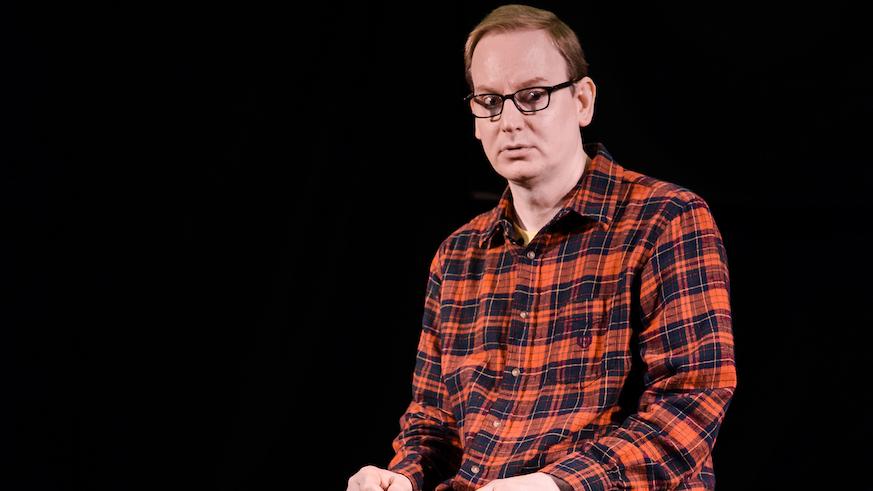Ask A Sex Abuse Survivor in the Metro

We would like to thank Madeline Presland and the Metro for this wonderful write up. The article also features a press photo (above) taken by the very talented Sarah R. Bloom. Read the full text below and see the article on the Metro site at this link:
Sharing a childhood of abuse onstage to help others understand
In interactive show, 52-year-old man speaks with audience about his struggles surviving sexual abuse as a child.
By Madeline Presland
Published : June 08, 2017 | Updated : June 09, 2017
Walking onstage to perform a one-man show isn’t easy. Acting out your own trauma is almost unheard of.
Michael Broussard, 52, takes the stage in a plaid shirt. He begins his show, “Ask a Sex Abuse Survivor,” by talking about a happy childhood he doesn’t remember. The memory of a child who loved dancing is lost to several years of rape and abuse that began when he was 7 years old. His stepfather was his abuser. Euphemisms are off the stage, and the pain isn’t sugar-coated. Broussard began writing his ever-evolving show in 2014. To this day, he continues to write his brutally honest narrative from his own memories.
“Every time I come up with something to try to portray it, and I start crying, I put it in the show,” said Broussard. “If I get mad, it goes in the show. It’s ripping the stitches open.”
Broussard, based in Landsdowne, Pennsylvania, has performed his interactive show up and down the East Coast for psychologists and law enforcement, and a crowdfunded performance was just held at the Adrienne Theater in Center City.
A key part of Broussard’s show is giving the audience time to ask questions and react at several points throughout the show. Instead of waiting to answer questions at the end, Broussard allows thoughtful pauses for discussion. Broussard breaks up the performance with opportunities for the audience to ask questions and give feedback. His focus on interaction makes the experience as much about others as it is about him. For Broussard, that’s the entire point of performing.
“This is very vulnerable,” said audience member and fellow performer Pete Haas. “Taking all of that emotion without a break would potentially be devastating.”
“The thing about audience feedback is that it’s terrifying,” said Broussard. “What I want people to do is talk about this and learn from it. You need to have feedback in order to do that.”
In addition to performing in front of a public audience, Broussard has also done his show in front of therapists and other professionals who want to learn through a new medium.
“I’m a walking, talking case study,” said Broussard. “People who are traumatized are re-traumatized every time they need to tell their story. I can answer questions about what happened to me when I was 7 from my perspective as a 52-year-old.”
“What Michael is doing we all do to some extent – channeling his anger and rage, so to speak, into a productive pro-social way,” said Dr. Steven Berkowitz of Penn’s Child and Adolescent Trauma Program. “He’s doing this by educating and helping people understand his experience and the experience of other people who were sexually abused as kids.”
In addition to diagnoses such as post-traumatic stress disorder and depression, Berkowitz says that substance abuse is a common struggle for adults who were sexually abused as children. The National Child Traumatic Stress Network reports that 70 percent of people who are in detox programs for substance abuse have a history with childhood abuse.
“This performance allows him to take those experiences into the world and not hang onto them,” said Berkowitz.
Broussard’s message is one of hope. The darker moments of his performance are offset by his sense of humor and a passionate love for the show “Doctor Who.” But after the applause ends, Broussard’s performances can take a toll on him. Reliving the abuse can trigger depressive episodes and panic attacks.
But he knows his shows must go on.
“I have seen people talk about their own abuse for the first time in their lives,” he said. “That makes me feel like there’s a reason for what I do.”
Learn more about the show at sexabusesurvivor.com.